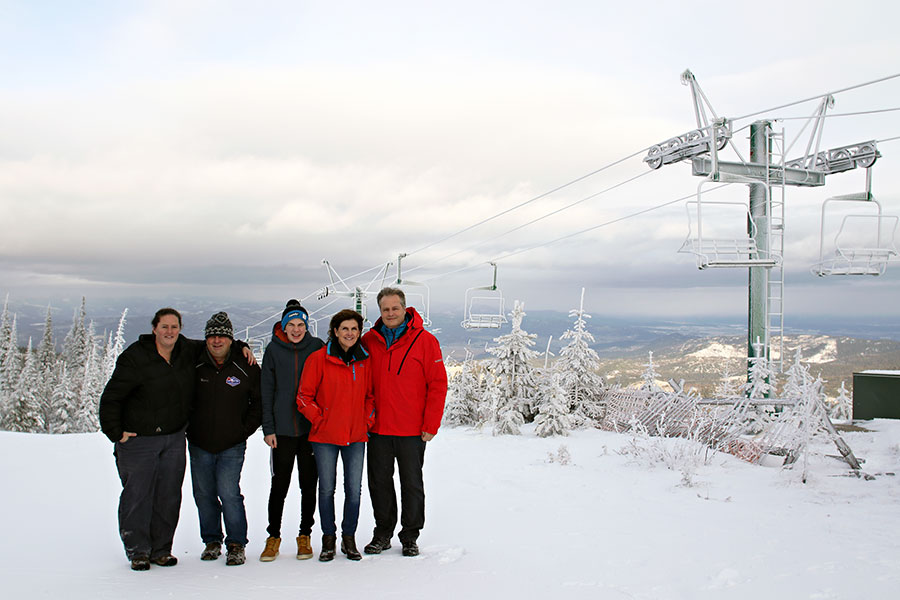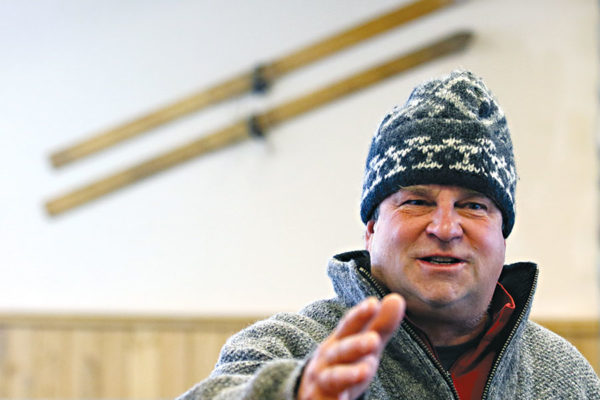From Blacktail to MARS
The Montana Alpine Race School (MARS) is giving ski racers young and old an opportunity to compete away from the crowds
By Andy Viano
Where John Steitz comes from, ski racers and the rest of the mountain’s occupants aren’t likely to find themselves on each other’s Christmas card lists.
Steitz has been coaching racers for 40 years and spent most of that time near Lake Placid, New York, a city best known for hosting the 1980 Winter Olympics and an area where ski racers in training are separated from the general public by fences, the universal tool for keeping out the riff-raff.
“Everywhere else we were kind of an elite ‘off there’ group,” Steitz said recently from the top of the Blacktail Mountain Ski Area in Lakeside. “It was a little chippy at times.”
When Steitz moved west, he stepped away from coaching ski racers for a brief stint before going to the place where most Northwest Montana skiers go, Whitefish Mountain Resort, and working with skiers there as part of the Flathead Valley Ski Education Foundation. But while Steitz said the ski community in Whitefish was a whole lot more inclusive and welcoming than out east, the crowds and challenging logistics at Whitefish made him and some of his pupils yearn for a few more wide-open spaces.
Enter Blacktail, the smaller, family-owned hill towering above Flathead Lake. Anne Paschen, a local ski racer who competes nationally on the masters circuit (age 21 and over), was skeptical.
“I have trained in a lot of places and John kept telling me you’ve got to come down here and check this place out, and I’m like, ‘yeah, yeah, it’s Blacktail,’” Paschen remembered with an extra-derisive oomph on ‘Blacktail.’ “And I got here and I was like ‘Oh my gosh.’ This is, really, truly; I call it a world-class ski area.”
Steitz started the Montana Alpine Race School in 2016 at Blacktail, and two years later he and a small contingent of students are training on the mountain just about every day it’s open (Blacktail had not yet opened for the season as of Dec. 17 — once it does the ski are is open Wednesday through Sunday). Everyone involved with the team said the sheer amount of space and the intimate culture at Blacktail work hand-in-hand to make it an ideal place to race.
“Here they let Josh set (up courses) all over the mountain,” Tom Abshire, a masters competitor, said. “And so on Saturday we could be skiing Super-G; long, fast courses. Sunday we’ll be skiing Giant Slalom over on this side and instead of, say, a 30-gate set … we’ll do 60-70 gates here and it’s a real racecourse, not a short practice course.”
The snow, too, makes Blacktail special for Paschen.
“It’s incredible terrain,” she said. “Because of the northern exposure, they get a little harder pack, more suitable for racing, and just the way the variable terrain is laid out there’s just so many opportunities to set up different kinds of courses … It’s really quite extraordinary. There’s no other team, I think, doing this type of training in Montana.”

MARS sets up the day’s course around 9 a.m. and Steitz stations himself at the base of the course, evaluating the skiers weaving through the gates and, sometimes, other skiers who just happened to find themselves in the middle of a race course during a day on the mountain (there are no fences at Blacktail). While skiers like Paschen may be blowing through gates with surgical precision, the courses are accessible for skiers of all abilities, a nod to the inclusive community of people that call Blacktail home.
Blacktail has had other ski racing programs over the years, and for Jessi Wood, the mountain’s snow sports director, having a place for her young skiers to go once they are finished with her beginner training program is an important addition to what she can offer.
“We’ve always loved having (ski racing),” she said. “It’s something that is just another piece of skiing in Montana and in the world, it’s just a different type. It’s like having freestyle skiers or having bumps or having the tiny 3-year-olds that I love skiing with, it’s just a piece of a larger culture.”
Participants in MARS classes can either attend a single day or purchase a season’s worth of instruction, with a full menu of options available online at www.montanaalpineraceschool.com. Skiers are outfitted with timing chips to attach to their boots that allow them to race against the clock, and each other, if they so desire, or for those new to ski racing to experience a different way to carve down the mountain.
“It refines you as a skier, it teaches you how to use your skis better, makes you a more technical skier,” Paschen said. “It’s very fast-paced, thrilling, exciting; it’s really fun.”
A day of skiing with MARS is $40 for single-day visitors, a cost that does not include a Blacktail lift ticket. The school offers two options for youth, a developmental program (age 8-12) and competitive junior race program (age 13-18). The masters program, which Steitz compared to rec-league basketball, offers weekend training options. MARS will also be holding a Christmas camp from Dec. 27-29 for developmental-level skiers. The cost to attend that camp is $150. For more information, contact Steitz at (406) 270-4768 or visit the MARS website.